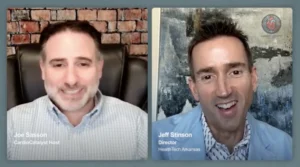What the Fire Ignited: Transforming Tragedy into Personal and Professional Success
When life’s challenges are the toughest, inspiration comes from those who’ve faced the worst and come out on top. Just ask Shay Eskew, Chief Sales Office at CirclesX, a man who took on life-threatening injuries as a child and transformed them into an inspiring life as an athlete. David Kemp sat down with Eskew, Author of What the Fire Ignited, to learn more about the man who views challenges as a doorway to opportunity.
Eskew’s main passions are his family, a wife and five children, and iron man competitions. These are things he didn’t think were possible when tragedy struck at eight. “My mom had asked me to warn my neighbors of an aggressive yellow jacket’s nest they had in the ground,” Eskew said. “I recruited my friend; we walked across the street; we knocked on the door. The dad wasn’t home, but the fifteen-year-old daughter was.” They showed the girl the nest. She lit a match on the nest and threw a cup of gasoline. The gasoline sprayed onto Eskew, and flames engulfed him. Life changed in an instant. And with no health insurance to cover extensive medical expenses, Eskew received a lifeline from The Cincinnati Shiners chapter, who stepped in to help.
Eskew received burns on over sixty percent of his body, and he told by physicians he’d never play competitive sports again over months of treatments and surgeries. Gauntlet thrown; challenge accepted. Eskew spent the next several decades transforming himself mentally and physically into becoming an athlete. “I’ve learned over the years that we all cherish the things we work for, not the things given to us.”
All the experiences and lessons Eskew’s learned he applies to his professional life working to solve health care challenges. “I’m a big believer in investing in teams,” Eskew said. “When you have the right team and culture, you can go places.” These values led Eskew to his current sales position with CirclesX. “What we do is look at paid Medicare claims, and using our technology, we can identify third-party payers, i.e., auto and workers-comp payers that should have paid the claim that inadvertently, or by frustration, got paid by Medicare.”








